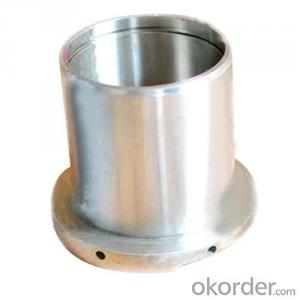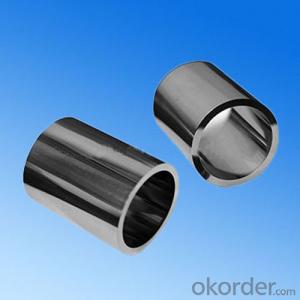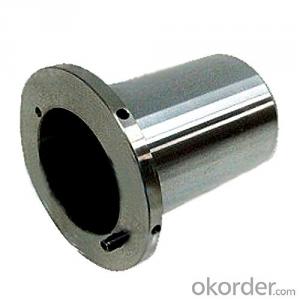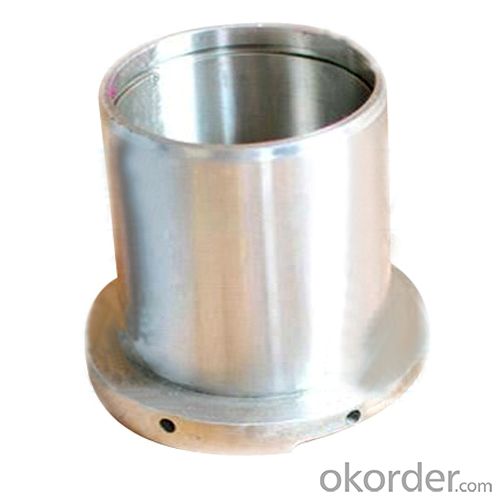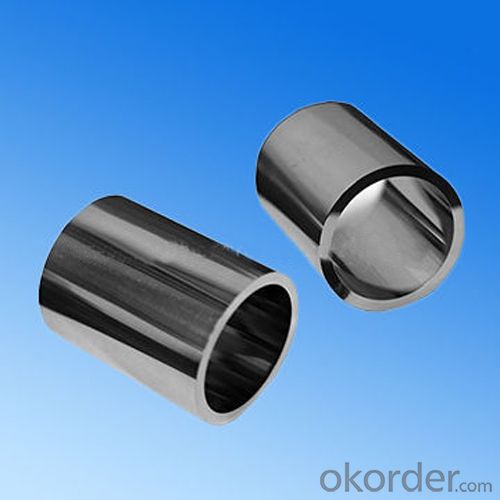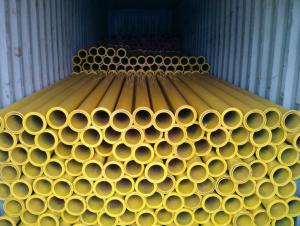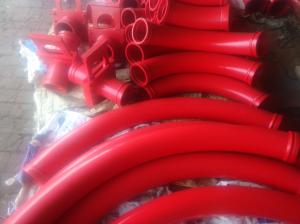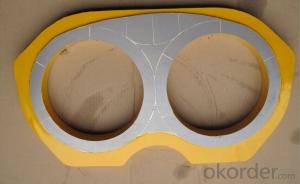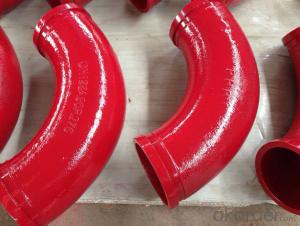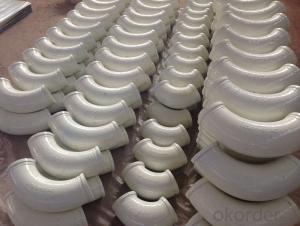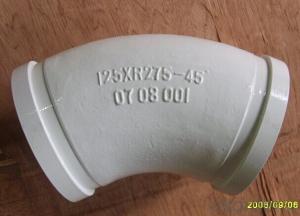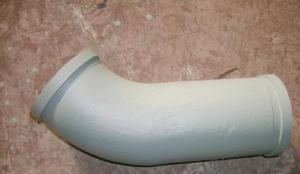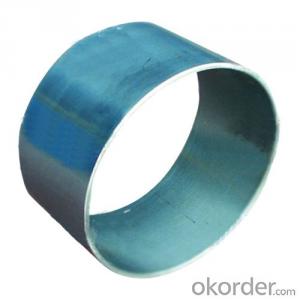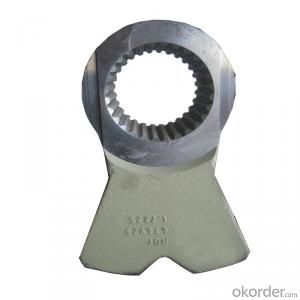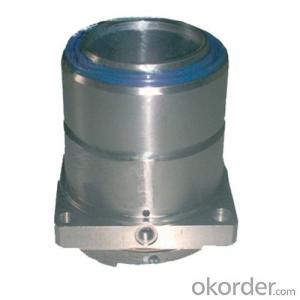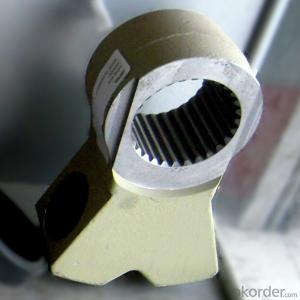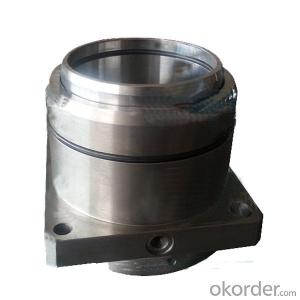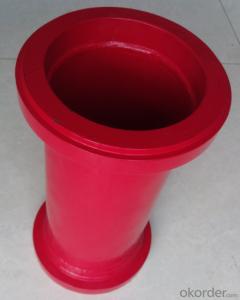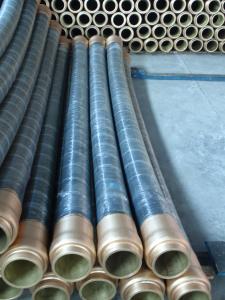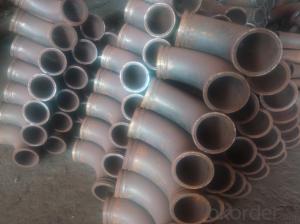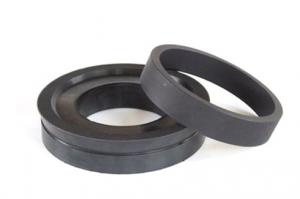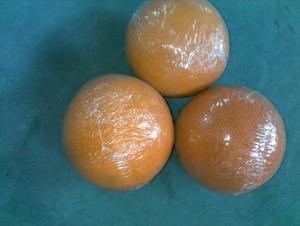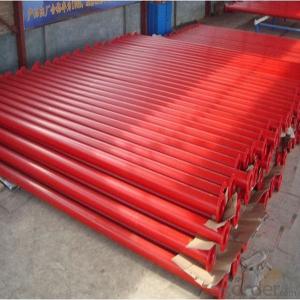Wear Sleeve Q80 Concrete Pump Parts High Quality
- Loading Port:
- Shanghai
- Payment Terms:
- TT OR LC
- Min Order Qty:
- 1 pc
- Supply Capability:
- 1000 pc/month
OKorder Service Pledge
OKorder Financial Service
You Might Also Like
Product information:
Wear Sleeve is the basic material among the frictional materials
They are widely used as the basic components for sealing
And the Wear Sleeve are widely adopted in petrochemical
industry due to its excellent performances such as wear ability, anti corrosion
Wear Sleeve is widely known for its durability and quality
It can withstand high pressure and is resistant to corrosion, so is used in water pumps, oil pumps and various other pumps
Today, Wear Sleeve has been playing an important role in the field of long working parts material
Salient features:
Special carbide grade developed for this application
Good cutting edge retention
Good functional lifespan
Applications:
Wear Sleeve is often used in concrete pumps.
Packing details for tungsten carbide tips:
Standard packing: plastic box inside, carton or wooden box outside
Advantages of our carbide products:
Made from 100% virgin raw material
Produced with advanced equipment
All products go through in-process and final inspection
Free technical service online
About our service:
OEM and ODM orders are welcome
Customized design is available
Reply your enquiry in 24 working hours
Experienced staffs will answer to all your questions in fluent English
Payment terms: we accept T/T, L/C, PayPal, Western Union, Escrow
Regarding T/T payment, the customers need to pay 30% in advance, the balance will be paid off after finished product before shipment
Regarding L/C payment, we just accept the irrevocable L/C, and buyer should pay all handle fee of the bank include our bank handle fee
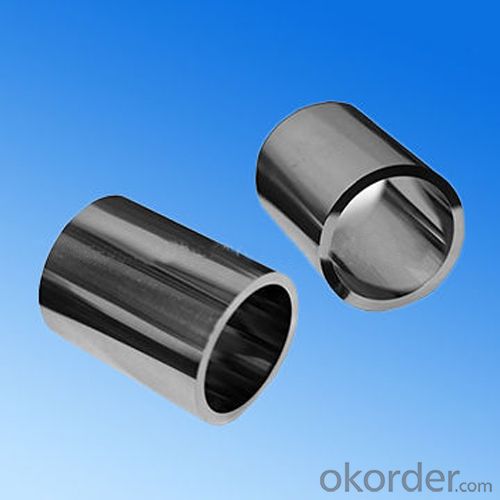
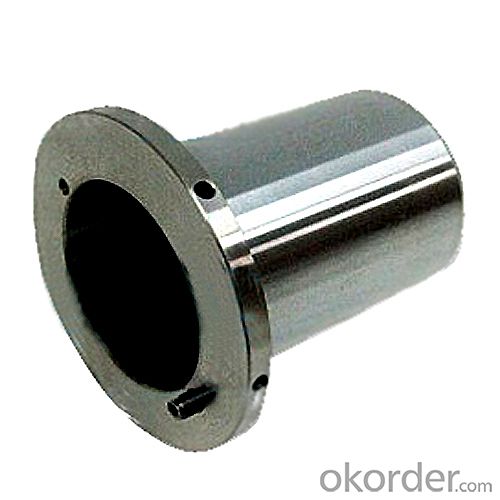
- Q: Which is the best home made concrete pump car?
- The three line is nine and Keni Le, jiubang, Linuo, etc., in addition to cheap, many of the subsequent trouble
- Q: Can concrete pump spare parts be repaired or refurbished?
- Yes, concrete pump spare parts can be repaired or refurbished. Many common spare parts such as seals, bearings, valves, and hydraulic components can be repaired or refurbished to extend their lifespan and save costs. Repairing or refurbishing these parts can involve replacing worn-out or damaged components, reconditioning or re-machining certain parts, and performing necessary maintenance and testing to ensure their proper functionality. Additionally, some manufacturers or specialized companies may offer services for repairing or refurbishing specific concrete pump spare parts, allowing for a more cost-effective solution compared to purchasing brand new parts. However, it is important to note that not all spare parts can be repaired or refurbished, especially if they are severely damaged or have exceeded their recommended service life. In such cases, it may be more practical and safer to replace the parts with new ones.
- Q: Are there any specific guidelines for the installation of control valves or solenoids in concrete pump spare parts?
- Yes, there are specific guidelines for the installation of control valves or solenoids in concrete pump spare parts. These guidelines typically include proper alignment, mounting, and connection procedures to ensure optimal performance and longevity of the components. Additionally, it is important to follow manufacturer's instructions and recommendations for the specific model of control valve or solenoid being installed.
- Q: How long do concrete pump pipes typically last?
- The lifespan of concrete pump pipes generally ranges from 25,000 to 40,000 cubic meters of pumped concrete. However, various factors like pipe quality, concrete type, pumping pressure, and maintenance practices can affect this duration. Regular inspections, cleaning, and appropriate storage methods can effectively prolong the lifespan of these pipes. Ultimately, it is crucial to monitor their wear and tear and promptly replace them as needed to ensure the efficiency and safety of concrete pumping operations.
- Q: How long does a concrete pump piston typically last?
- The lifespan of a concrete pump piston can vary depending on several factors. On average, a concrete pump piston typically lasts between 20,000 to 40,000 cubic yards of pumping. However, this estimate can be affected by a variety of factors such as the quality of the concrete being pumped, the maintenance and care of the pump, the operating conditions, and the expertise of the operator. Regular maintenance and servicing, including cleaning and lubricating the piston, can significantly extend its lifespan. It is also important to monitor the wear and tear of the piston regularly to ensure its optimal performance and to replace it when necessary.
- Q: What are the advantages of using polyurethane components in concrete pump spare parts?
- There are several advantages of using polyurethane components in concrete pump spare parts. Firstly, polyurethane is highly durable and resistant to wear and tear, ensuring longer lifespan and reduced maintenance costs. Secondly, polyurethane has excellent abrasion resistance, which allows it to withstand the harsh conditions and high pressures involved in concrete pumping. Additionally, polyurethane components offer superior flexibility, allowing for easier installation and reduced risk of breakage. Lastly, polyurethane is known for its chemical resistance, ensuring that the spare parts can withstand exposure to various chemicals and substances commonly found in concrete. Overall, using polyurethane components in concrete pump spare parts provides enhanced durability, flexibility, and resistance to abrasion, making it a preferred choice in the construction industry.
- Q: Are there any warranties or guarantees available for concrete pump spare parts?
- Concrete pump spare parts come with warranties and guarantees to ensure their quality and performance. Various manufacturers and suppliers provide these warranties, which typically cover defects in materials or workmanship. The coverage period usually ranges from a few months to a year or more. Furthermore, some suppliers offer guarantees on the performance or durability of their spare parts, providing customers with reassurance. To ensure your protection in case of any issues, it is advisable to inquire about the specific warranty or guarantee terms before purchasing concrete pump spare parts.
- Q: Are there any specific guidelines for the installation of control panels or electronic components in concrete pump spare parts?
- Yes, there are specific guidelines for the installation of control panels or electronic components in concrete pump spare parts. When installing control panels or electronic components in concrete pump spare parts, it is important to consider the following guidelines: 1. Protection from Moisture: Concrete pump spare parts are exposed to moisture, which can be detrimental to electronic components. It is advisable to install control panels or electronic components in waterproof or moisture-resistant enclosures to prevent damage from water or humidity. 2. Vibration and Shock Absorption: Concrete pump spare parts are subject to vibration and shock during operation. To prevent damage to control panels or electronic components, it is recommended to use shock-absorbing mounts or vibration-resistant enclosures to minimize the impact of these forces. 3. Temperature Control: Concrete pump spare parts can be exposed to extreme temperatures, both hot and cold. It is crucial to ensure that control panels or electronic components are installed in a temperature-controlled environment. This may involve using insulation or cooling systems to maintain a suitable operating temperature range. 4. Wiring and Connections: Proper wiring and connections are essential for the functioning of control panels or electronic components. It is important to follow the manufacturer's instructions and guidelines for wiring, ensuring that connections are made securely and that proper insulation and protection are provided to prevent short circuits or electrical hazards. 5. Accessibility and Maintenance: Control panels or electronic components should be installed in a manner that allows easy accessibility for maintenance and repairs. It is recommended to leave enough space around the components for easy inspection, servicing, and replacement if necessary. By adhering to these guidelines, the installation of control panels or electronic components in concrete pump spare parts can be done in a manner that ensures their long-term functionality and durability.
- Q: What are the advantages of using stainless steel components in concrete pump spare parts?
- There are several advantages of using stainless steel components in concrete pump spare parts. Firstly, stainless steel has excellent corrosion resistance, which ensures the longevity and durability of the spare parts even in harsh environments. Secondly, stainless steel is known for its high strength-to-weight ratio, providing increased strength and reliability without adding excessive weight to the concrete pump. Additionally, stainless steel is highly resistant to wear and tear, which reduces the need for frequent replacements and maintenance. Lastly, stainless steel components offer a hygienic and clean surface, making them suitable for applications in the construction industry where cleanliness is crucial.
- Q: What are the common signs of wear and tear in a concrete pump cylinder?
- Some common indications that a concrete pump cylinder is experiencing wear and tear include: 1. Leakage of oil or hydraulic fluid: The presence of oil or hydraulic fluid leaking from the cylinder is a clear indication that it has sustained damage or wear. This could be a result of cracks, worn seals, or damaged gaskets. 2. Decreased pumping efficiency: A worn cylinder may lead to a reduction in pumping efficiency, resulting in the concrete pump's inability to deliver the same amount of concrete as before. This decline could be due to a decrease in the cylinder's internal diameter or worn piston rings. 3. Heightened noise and vibration: As the cylinder deteriorates, it may produce more noise and vibration during operation. This can suggest issues like misalignment, loose components, or damaged internal parts. 4. Uneven or rough concrete output: A worn cylinder can cause the concrete output to be uneven or rough. This issue may arise from an irregular internal surface or damaged piston rings, which disrupt the smooth movement of the piston. 5. Excessive generation of heat: A worn concrete pump cylinder may generate additional heat while in operation. This can be attributed to increased friction between moving parts, which can further contribute to accelerated wear and tear. 6. Visible damage or corrosion: By inspecting the cylinder's surface, visible signs of wear and tear such as scratches, dents, or corrosion can be identified. These damages can compromise the cylinder's integrity and may necessitate repair or replacement. It is crucial to regularly inspect the concrete pump cylinder and promptly address any signs of wear and tear to prevent further damage and maintain the pump's optimal performance.
Send your message to us
Wear Sleeve Q80 Concrete Pump Parts High Quality
- Loading Port:
- Shanghai
- Payment Terms:
- TT OR LC
- Min Order Qty:
- 1 pc
- Supply Capability:
- 1000 pc/month
OKorder Service Pledge
OKorder Financial Service
Similar products
Hot products
Hot Searches
Related keywords
